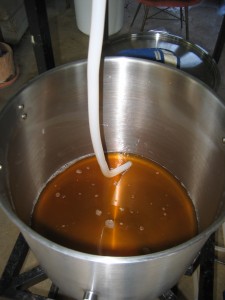Session beers are low-alcohol beers that allow the drinker to consume a few without becoming too intoxicated. In order to be of high quality, the brewer must pay just as much attention to brewing a session beer as he would to brewing any normal or high-gravity beer. In the next week, I am going to post a few articles with tips on how to make the best session beers. Today’s entry concerns how much wort to collect from the mash.
A fully-sparged grain bed has been rinsed of all the sugars the brewer can obtain without extracting excess tannins and silicates. On my homebrew system, using my methods, I can yield around 0.65 gallons per pound of grain (5.3 L/kg). If I collect a volume short of that, I have left fermentable carbohydrates behind. If I collect more than that, and I risk astringency. This has some implications when brewing a low-gravity session beer.
Below a certain original gravity (OG), a fully-sparged grain bed will yield a volume of wort less than can be boiled for 60 minutes and still yield 5.0 gallon (19 L). In fact, below a certain OG, a fully-sparged grain bed will yield a volume of wort smaller than your batch size. When this happens, the brewer will need to add water to make up his or her full-pre-boil wort volume.
Below is a chart that shows beers with target OGs in the session beer range, how much pale malt would be required to hit that target (assuming 75% extract efficiency), and the volume of wort the brewer should collect. Use the chart as a guideline, but also measure the pH and specific gravity of your final runnings if you fly sparge. You can also simply taste the runnins to see if astringency is beginning to show. Once your grain bed is fully sparged, simply add water to hit your desired pre-boil volume. It’s that simple. 




Recent Comments